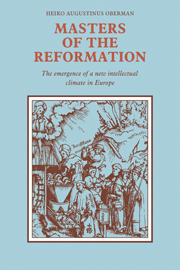Book contents
- Frontmatter
- Contents
- Preface
- Abbreviations
- Map
- PART I INTELLECTUAL RENEWAL
- 1 The ivory tower: the university as observatory
- 2 The impact of humanism: fact and fancy
- 3 The scholastic rift: a parting of the ways
- 4 The devotio moderna: movement and mystery
- 5 Patterns of thought on the eve of upheaval
- 6 The Augustine renaissance in the later Middle Ages
- PART II THE GRAPES OF WRATH
- PART III NEW JERUSALEM WITHIN THE OLD WALLS
- Student population at German universities 1385–1540
- Chronological outline
- Bibliography
- Index of names and places
- Index of modern authors
- Subject index
2 - The impact of humanism: fact and fancy
Published online by Cambridge University Press: 07 October 2011
- Frontmatter
- Contents
- Preface
- Abbreviations
- Map
- PART I INTELLECTUAL RENEWAL
- 1 The ivory tower: the university as observatory
- 2 The impact of humanism: fact and fancy
- 3 The scholastic rift: a parting of the ways
- 4 The devotio moderna: movement and mystery
- 5 Patterns of thought on the eve of upheaval
- 6 The Augustine renaissance in the later Middle Ages
- PART II THE GRAPES OF WRATH
- PART III NEW JERUSALEM WITHIN THE OLD WALLS
- Student population at German universities 1385–1540
- Chronological outline
- Bibliography
- Index of names and places
- Index of modern authors
- Subject index
Summary
‘In that same year of our Saviour 1477, thanks to the initiative of the renowned Count Eberhard of Württemberg and Montbéliard and his illustrious mother, Lady Mechthild, a university was established with papal approval in the city of Tübingen in the diocese of Constance, located in the ecclesiastical province of Mainz…’ With this matter-of-fact notice Johannes Vergenhans (Nauclerus) recorded the founding of the University of Tübingen in his account of world history. That the event found mention at all in a broadly conceived history of humanity may well be ascribed to local pride, while the modesty of the university's first rector may be responsible for the chronicler's silence regarding his own role in the school's planning and preparation. In contrast, Nicholas Baselius, a monk of Hirsau and the editor of Vergenhans' chronicle, concluded his supplement for the years 1500–13 with a proclamation of the rebirth of Germany; a rebirth furthered from the outset by Tübingen professors and students and transmitted in a golden chain fashioned link by link in the minds of men such as Johannes Reuchlin, Gabriel Biel, Wendelin Steinbach and Johannes Eck.
To attribute this pompous assessment of Tubingen's significance for the history of ideas to mere provincial chauvinism would be too simple, since nearly the same judgment appears in a contemporary comparative account of European university history: ‘Tübingen was one of the earliest universities to welcome first the new learning and then the Reformation. It numbers Reuchlin among its teachers and Melanchthon and Eck among its students.’
- Type
- Chapter
- Information
- Masters of the ReformationThe Emergence of a New Intellectual Climate in Europe, pp. 15 - 22Publisher: Cambridge University PressPrint publication year: 1981



